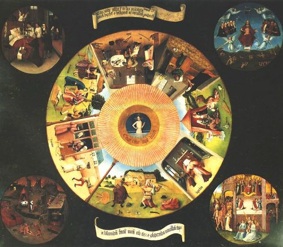
I’ve always understood sloth, one of the seven deadly sins, as laziness. But Christian author Kathleen Norris helped me understand the “sin” in a much broader context, and one that’s intertwined with depression. (Not that depression is a sin. I want to make that clear) Here are some excerpts from her article in Christian Century entitled “Falling into Sloth” about her year in the wasteland.
I’ve had plenty of chances to laugh at myself in the last year. Once, when I was sunk so deep in lethargy and sloth that there seemed no end in sight, an interviewer termed me “a docent of hope.” How comical, to be reminded that the books I churned out over the past ten years–“Dakota,” “The Cloister Walk,” “Amazing Grace” and “The Virgin of Bennington”–were out there in the world, proclaiming good news while I sat stupefied, unable to write even a postcard.
The disparity was grim, but funny: God’s grace working despite my weakness, or maybe because of it. I was tempted at times to regard myself and my work as a fraud. But then I realized I could be a fraud only if I bought into the myth of celebrity. By that I mean the notion that people who write books on spirituality do so because they’ve got it all figured out. They have somehow “succeeded” at the spiritual life. Once a journalist titled an interview with me, “Woman Finds Peace in Monastery.” A monk who had seen the piece commented, “How did you do that? I’ve been here for 40 years, and I’ve never found peace.”
My most “spiritual” activity, over the past year, was cleaning commodes and urinals for my husband; giving him baths and helping him change his clothes. I may not have been good at praying my psalms, but the prayer of the commode—that, I could handle.
The comedy of grace is that is must so often come to us as loss and failure and cleaning commodes because if it came as success and gain and sweet-smelling flowers, we wouldn’t be grateful. We would, as we are wont to do, take personal credit for the unwarranted gifts of God. For the grace to be grace, it must give us things we didn’t know we needed, such as the pain of loss, or illness, or spiritual drought. As we stumble through the altered landscape of our lives, we find that God is enjoying our attention as never before. And maybe that’s the point. We have finally dropped the mirror, and are looking for God. It is a divine comedy.
I have always been an industrious person, good at meeting deadlines. My strength as always been that of the woman warrior, good in a crisis, good at striving against all odds. But as so often happens when God sets about to change us, this year my strength became my weakness. I could function, but not feel. I could generally meet my responsibilities as a caregiver to my husband and my dying father, and help support my mother, but I felt dead inside. I dreaded waking in the morning, and sometimes went straight from bed to the couch, where I would watch television or do crossword puzzles until it became absolutely necessary to rouse myself to action. The hateful “noon-day demon” of the desert monks had found me in the lush environs of Honolulu, and made me unable to respond to the beauty of the planet. I was a far weaker soul than I cared to admit, a person pathetically subject to the sin of sloth.
We often think of sloth as a harmless form of physical laziness, and joke about how long it’s been since we vacuumed the carpet. But sloth is much more than laziness. It is an inability to concentrate of serious matters, and profound weariness of soul. As Evelyn Waugh once wrote, “The malice of sloth lies not merely in the neglect of duty (though that can be a symptom of it) but in the refusal of joy. It is allied to despair.”
As a Benedectine oblate, I should take sloth seriously, for at the very beginning of his “Rule” Benedict asserts that it is only when we give up “the sloth of disobedience” that we can begin turning to Christ. This past year I have needed to remind myself that life, and especially spiritual life, is not a progression, but a constant turn of withering and blooming, sin and repentance, exile and return. I’ve had to remember that it is God, and not myself, who has the power to make the barren places bloom, and strike water from the rock.
In Romans, Paul reminds us that whether we judge one day to be better than another, or judge all days to be alike, the crucial thing is to live as if each day belongs to the Lord. The psalms remind us that to God, night is the same as day. To the person of faith, this is heaven; to one mired in sloth, it is hell. The Christian hope is that in allowing faith to illumine our darkest night we are better able to control the darkness that strikes at noon, just when things seem to be going well, and we feel as the peak of our powers. Whether we stand in darkness or in light, God is with us there.

